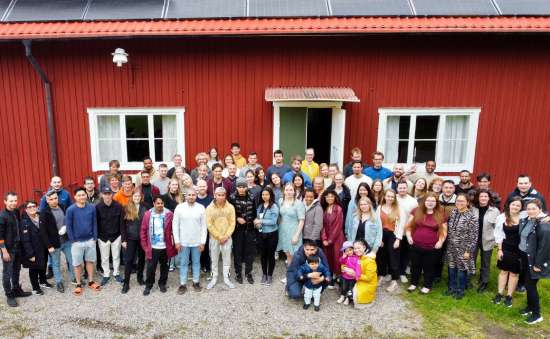What Do Adventists Offer for Young Adults?
In recent years, the age group often classified as “young adults” has been trickier to engage. It’s been a significant concern for Christian churches around the world. Though interestingly enough, similar observations regarding young adults have been coming up in conversations about the economy, the entertainment industry, politics, and more.
We could discuss the likely causes for this disengagement until we’re blue in the face. But most research agrees that these young people, aged 18-35, often report feeling lonely, misunderstood, and/or frustrated with the status quo. They also long for community and acceptance.1
That’s why the Seventh-day Adventist Church makes it a priority to understand and cater to the unique needs of today’s young adults in the volatile, digitally-focused, social-media-saturated society we live in.
Generational differences are inevitable, so our methods will be ever-adapting. But here’s a look into what the Adventist Church does to help young adults have a place to belong and a place to serve with their gifts.
We’ll go over:
- What are young adult ministries
- The history of young adult ministries
- Benefits of young adult ministries
- How to find young adult church groups or programming
Let’s get started.
What are young adult ministries?
 As of recently, young adult ministries focus on the age group and stage of life that begins in the later years of college, or as a young person is becoming independent. This usually ends up covering the ages of 21-30.2
As of recently, young adult ministries focus on the age group and stage of life that begins in the later years of college, or as a young person is becoming independent. This usually ends up covering the ages of 21-30.2
The official mission of young adult ministry in the Adventist Church is:
“The engagement and salvation of young adults through Jesus Christ. We understand this ministry to be that work of the church that is conducted for, with, and by young people.”3
Although there are official resources and programming from the General Conference,4 or the World Headquarters of the Seventh-day Adventist Church, most young adult ministry options are organized and operated on the local level, because the size and needs of this age group can vary so much depending on location and community type.
For example, the North American Division (NAD) has a ministry called the Adventist Christian Fellowship.5 Their goal is for Adventist college students to witness at public colleges.
And at individual church locations, you might find:
- Young adult Sabbath school groups
- Young adult Bible study groups
- Interest-based activity groups (biking, hiking, board games, book clubs, etc.)
- Hobby-based activities (drawing, knitting, or cooking)
- Community service projects (food donations, distributing Christian literature, homeless feeding, Habitat for Humanity, etc.)
- Stage-of-life activities or events (parenting groups or classes, marriage encounter events, financial planning seminars, etc.)
- Mission trips (like this mission cruise!)
Overall, these programs help young people grow spiritually as they befriend and serve others.
How young adult ministry started in the Adventist Church
The first young adult ministry was created in 1879, when two teenagers formed the Adventist Youth Society.6 Henry Fenner and Luther Warren saw the need for a community of believers to uplift and guide each other to Christ.7 This group ministered to both Adventists and non-Adventists—joining them together in Bible study, worship, and fun activities.8
In 1907, the Adventist Church formally created a ministry called, “Young People’s Society of Missionary Volunteers.”9 But by 1979, this name was shortened to “Adventist Youth.”10
Today, however, the phrase “Adventist Youth” refers to ministries for high school-aged kids. Whereas the ministry for 20-35-year-olds is now called Young Adults, or YA—a category that is relatively new not just in the church realm, but in society as well.11
But you still might find some longer-running young adult programs to still use the term “youth” to refer to any ministry for people 35 and younger.
The Adventist Church uses the young adult ministry program to:
- Encourage young adults to strengthen their relationship with Christ as they establish their independence
- Empower them to be leaders or difference-makers among their peers (and the church as a whole)
This ministry has involved youth leadership training from the very beginning. The Bible reaffirms that the youth shouldn’t be underestimated (1 Timothy 4:12).
In fact, many of Adventism’s early founders started God’s work in their late teens and twenties.12
History has proved that when it comes to serving God, age isn’t an issue!
Benefits of young adult ministries

Photo by Brooke Cagle on Unsplash
Young adult ministry programs can help strengthen people’s relationships with Jesus as well as with others. It can also provide support and community during a time of life when you’re just beginning to establish your household, your career, your family, or even your identity as you consider your place in today’s world.
These ministries seek to do that by:
- Helping develop a Christian character
- Teaching how to witness and serve, as life presents more opportunities than when you were younger
- Helping maintain a Christ-centered life (prioritizing responsibility to Christ over worldly responsibilities)
- Establishing a Christian community focused on belonging, support, and encouraging one another
Because if anyone needs a tight-knit community of fellow believers, it’s young adults.
On top of solidifying their professional identity, young adults are at the stage where they start to assess the effectiveness of their upbringing, especially when it comes to their beliefs. For the first time in their lives, they may be left to make significant life decisions on their own. And one of the most critical decisions is deciding whether to join a church or not.
They’re trying to ask themselves why they believe what they do—or why they attend church. Those born into the church often begin with what’s referred to as “adolescent faith.”13 They are used to accepting the teachings of their parents and authority figures without much question.
But there comes a time when young adults must choose to do those things because they have internalized their beliefs—not because they’re being told to.
And as young adults start to evaluate their beliefs, they look for a support system. They’re looking for people to gently guide them to the truth. They’re looking for peers to connect to.
But sometimes, well-intentioned churches get caught up in preaching doctrine while neglecting fellowship and friendship.
Questioning one’s long-held beliefs can be a frightening experience. So young adult ministry aims to provide a welcoming environment where young people can navigate life’s questions with Bible principles. Their mission is to provide young adults with authenticity, belonging, compassion, and discipleship.14
How to get involved in local groups
 If you’re a young adult and looking for something that could be helpful for you at this stage of life, you can first start by looking up the nearest Seventh-day Adventist Church. Their website or social media page is likely to have information about their different Bible study groups and ministries.
If you’re a young adult and looking for something that could be helpful for you at this stage of life, you can first start by looking up the nearest Seventh-day Adventist Church. Their website or social media page is likely to have information about their different Bible study groups and ministries.
If nothing else, joining a group can give you the chance to meet other people interested in serving God and making the most of their lives. It’ll give you a chance to connect with people who face the same challenges as you. (Not to mention it can also be a great place for fun activities and good food…)
And if you’re the kind of person that has a passion for serving young people, you could get involved, too! Get started by deciding what your passion for service or ministry is. You can serve multiple ministries, of course, but it helps to narrow it down. And it’ll help your search be more specific.
But the most important thing you can do is get started. Make the first step, and pray that God will help you take it from there. He can lead you to a group or a ministry that best fits your needs and aspirations.
Find more information and resources about young adult ministries and programming:
- Worldwide Young Adults ministry for Adventists
- Adventist Christian Fellowship for public college campuses
- Keep up with the US Adventist Youth & Young Adult Facebook page
- Adventist Youth ministries in multiple divisions of the worldwide church:
– North American Division
– Inter-American Division
– South American Division
– East-Central Africa Division
– West-Central African Division
– Southern African-Indian Division
– Inter-European Division
– Trans-European Division
– Northern Asia-Pacific Division
– South Pacific Division
– A quick-start guide for young adult ministry initiatives
– Adventist Young Professionals network
Related Articles
- Earls, Aaron, “8 Reasons Young Adults Leave Your Church (and 8 Reasons They Stay)”. [↵]
- https://www.gcyouthministries.org/ [↵]
- https://www.gcyouthministries.org/ministries/young-adults/mission-aim-motto-and-pledge/ [↵]
- https://www.gcyouthministries.org/ministries/young-adults/ [↵]
- “Adventist Christian Fellowship”. [↵]
- Seventh-Day Adventist Pastor’s and Elder’s Handbook for Youth Ministry, page 10 (The General Conference of Seventh-day Adventists, 2002). [↵]
- Ibid [↵]
- Ibid [↵]
- Ibid [↵]
- Ibid [↵]
- “Young Adults.” [↵]
- “Youth” in adventist.org, Seventh-day Adventist World Church, Accessed July 26, 2022. [↵]
- Russell, Gary, in Ministry Magazine: “Young adult ministry: let the baby-sitting cease”. [↵]
- Institute of Church Ministry: “Loving and Leaving: SDA Youth Attitudes and Behavior to the church”. [↵]
More Answers
Seventh-day Adventist World Population and Demographics
The Adventist Church has more than 22 million members and 100,000 churches worldwide, plus a large system of hospitals, schools, and publishing houses. Learn more about this diverse church.
What Is a Seventh-day Adventist Camp Meeting?
Although camp meetings didn’t begin with the Seventh-day Adventist Church, they’re as much an Adventist thing as haystacks.
Camp meeting is an extended event for Adventists (and non-Adventists) of all ages to gather and participate in spiritual seminars and activities. During the event, attendees often camp in tents, campers, or RVs.
How to Join the Seventh-day Adventist Church
Whether you heard about the Seventh-day Adventist Church through a traveling evangelist, during your online searches, or through a loved one or relative, you might be considering joining yourself.
How Do Adventists Do Baby Dedications?
For Christians, dedication ceremonies for babies, also for older children, are an important time for parents and the church. It’s a special part of the worship service when parents present their young children to God and the church family. Both parents, along with the congregation, regard this as a solemn promise to be a Christ-like example to the child.
Do Adventists Celebrate Communion and Foot Washing?
Like many Christian denominations, Adventists regularly participate in communion, also referred to as the “Lord’s Supper” or the “Last Supper.” They also practice foot washing (John 13:1-20), or the “ordinance of humility,” during the service—which isn’t as common.
What is the Concept of “Present Truth” and Why is it Important?
Present truth is the principle that certain biblical truths are relevant to God’s people at specific times in history. God sends the Holy Spirit to reveal truths that help us better understand how to interpret and apply His Word in a present moment.
Do Seventh-day Adventists Celebrate Easter
Yes, many Seventh-day Adventists do celebrate Easter.
Does the Adventist Church Have Youth Ministry Programs?
The Seventh-day Adventist Church has been organizing and operating youth ministry programs since 1879.
In our opinion, youth ministry is one of the most important ministries a church can have.
Do Adventists Celebrate Birthdays?
Yes, most Seventh-day Adventists do celebrate birthdays because we see them as excellent reminders of the life God has blessed us with. And we celebrate them the same way everyone else does—with friends, family, presents, and a special meal.
Do I Need to be an Adventist to be Saved?
The answer to this question is simply, “no.”
When it comes to salvation in Jesus Christ, all that is required of a person is to acknowledge Jesus’ sacrifice for us, believe that He has saved us, and claim the free gift of salvation that is always available to us. Salvation is not based on denomination.
Do You Have to Be Vegetarian to Be Adventist?
Of course not. Membership in the Seventh-day Adventist Church has never included any dietary requirements. However, there might be some reasons people might think that. So many Adventists are vegetarians or even vegan, and a plant-based lifestyle has many health benefits.
All About Seventh-day Adventist Colporteurs
The Seventh-day Adventist Church uses a variety of methods to spread the hope of the gospel to the world. One of these ways is through colporteuring, also called “canvassing” or “literature evangelism.”
What Is an Adventist Book Center (ABC)?
When you walk into any one of the many Adventist Book Center (ABC) locations, chances are you’ll be greeted by pleasant gospel music in the background, friendly employees, and row after row of Christian books, movies, Bibles, study guides, kids’ games, and more.
Do Seventh-day Adventists Celebrate Holidays?
Wondering whether your Adventist classmate or coworker keeps the same holidays you do? Perhaps you want to include them in some festivities, but you also want to respect their beliefs. Thus, you’re unsure of how to navigate the holiday question. Will they accept your invitation to the office Christmas party?
The Adventist Haystack (It’s Not What You Think) + 4 Recipes
Haystacks are basically a taco salad—with an Adventist spin on it! Most versions are vegetarian and offer an endless combination of tasty toppings. We eat them often because they’re healthy, scrumptious, and easy to make.
Do Seventh-day Adventists Believe in Medical Care?
The Seventh-day Adventist Church believes in and supports evidence-based medical care. In fact, medicine has played a significant part in our history, and today we run a major health system with hospitals, medical schools, and clinics throughout the world.
All about Adventist Elementary Schools
The Seventh-day Adventist Church operates the largest Protestant education system in the world. A big part of this system is our K-8 elementary schools, or primary schools, as they’re known in other parts of the world.
What Are Pathfinder and Adventurer Clubs?
Like the boy or girl scouts, Pathfinders and Adventurers learn about nature and life skills. But what makes these clubs special is their purpose to bring young people closer to Jesus.
A Look at Adventist Colleges and Universities
On the outside, Seventh-day Adventist universities may not look much different than other college campuses. But the real differences are beneath the surface.
What Is ASI (Adventist-Laymen’s Services and Industries)?
ASI, which stands for Adventist-laymen’s Services and Industries, is a membership-based organization that provides support for Seventh-day Adventist laypeople (Adventist professionals who aren’t pastors).
What Are Adventist Evangelistic Meetings?
The Seventh-day Adventist Church puts a huge emphasis on sharing the gospel through evangelism, or sharing the gospel through preaching, teaching, and testimony. One of the ways we accomplish this is by organizing public events called evangelistic meetings.
Christian Summer Camps—A Cherished Adventist Ministry
School’s out, the sun’s shining, and your kids are thrilled to have the summer ahead of them. Then three days in, you hear, “I’m bored…”
Do Adventists Have Their Own Bible?
Adventists have some unique beliefs—you might be able to name some of them right now. The seventh-day Sabbath. Death as a sleep. Hell as nonexistence.
What Is Vespers?
Friday rolls around, and you’re spending time with your Adventist friends or relatives when they mention they’re going to vespers tonight.
Adventist Pastors
What is the role of a pastor in the Adventist Church? The position itself, at least as far as a local congregation is concerned, is not much different from that of pastors in other protestant denominations.
The Leadership Structure of the Seventh-day Adventist Church
The Seventh-day Adventist Church has a representative form of structure that connects its 90,000-plus congregations across the globe and gives its members a part in decision-making. Though the Church was incorporated in 1863, this system came about during the church’s reorganization from 1901 to 1903. It includes four levels of organization.
What to Expect When You Go to an Adventist Church
If you’re attending an Adventist church for the first time, you may wonder what it’s really like. While each Adventist church is unique in its collective personality and local culture, Adventist church services are generally similar to most other Protestant church services.
Adventist Education
Seventh-day Adventists have historically upheld the importance of a well-rounded, high-quality education. Instead of a one-size-fits-all approach to teaching and learning, the Adventist Education system operates on the principle of educating the “whole” person.
Evangelism
Evangelism is simply sharing the truths of the Bible with someone else. And Adventists are all into it.
Didn’t find your answer? Ask us!
We understand your concern of having questions but not knowing who to ask—we’ve felt it ourselves. When you’re ready to learn more about Adventists, send us a question! We know a thing or two about Adventists.
































